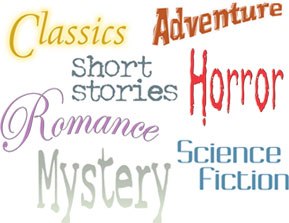Hey people, how are you?
The topic chosen for this week's e-tivity is the genre of wikis. Before I begin my analysis, let's explain what the word wiki stand for. Wiki means "quick" or "informal" in Hawaiian and is a type of interactive website or better, to use Matthew Buckland's words, "is a collaborative article that is updated with new and improved information submitted and published by the audience, not just by an author or authors".
I've explored some wikis I've found on the Net and for my analysis I've chosen Wikipedia, a free encyclopedia that anyone can edit (as it is said on its main page). This wiki is maybe the most famous but I've observed that there are many others which are very interesting and well-constructed, as for example Wikihow, PBwiki, Library Success or Wetpaint, just to mention some.
Purposes
There is not an intended audience for Wikipedia because everyone can collaborate, the only request is that you are supposed to know what you are writing about when you contribute to the drafting of an article.
Language features
Wikipedia is available in many languages. Dealing to English I think that the language is more formal if compared to blog's one but not too formal to be understandable only if you have a dictionary with you ^_^. In other words, is not as formal as the language we usually found on the encyclopedias we have at home.
Characterisitcs
The articles are divided into different sections (for example arts, history, society ... ) and in each article there are lots of hyperlinks which allows you to verify what you don't know just by clicking on it.
Moreover there in the Help section you can find explanations on how to use the website and answers to your more usual questions.
Summing up...
Wikipedia is very useful because you can widen your knowledge and it is especially helpful for those people like me who are students of a foregin language because through the reading or the editing of an article you can improve your comprehension and writing skills.
See you soon
Alice
Thursday, November 30, 2006
Wednesday, November 22, 2006
To "podcast" or not to "podcast"?
Hi my dear blog friends!
This week's e-tivity is dealing with podcast. What does this strange word mean? A podcast is a multimedia file (either audio or video) and it can be downloaded onto personal computers or mp3 players so that users can listen to or watch it whenever and wherever they want to.
I've explored the "podcastsphere" and I've found some interesting websites which provides you a great number of helpful podcasts if you want to imrpove your language skills and I've bookmarked them on del.icio.us.
The first is Ello. Here you can find a lot of podcasts and activities which help you to improve your English grammar and vocabulary. Moreover, there is a very interesting section called "English by Region" in which you can explore the different accent of English.
The second website I've chosen is spotlight. Lots of audio and multimedia files are available and downloadable here. If you explore the website you will also find that in the section called "Learning English" there is a very good archive full of activities to do by your own.
The third and last link I give you is very useful for English Foreign Learners because there are lots of activities and excercises to make.
What else can I say about podcast? Click here and just listen to my impressions about it.
This week's e-tivity is dealing with podcast. What does this strange word mean? A podcast is a multimedia file (either audio or video) and it can be downloaded onto personal computers or mp3 players so that users can listen to or watch it whenever and wherever they want to.
I've explored the "podcastsphere" and I've found some interesting websites which provides you a great number of helpful podcasts if you want to imrpove your language skills and I've bookmarked them on del.icio.us.
The first is Ello. Here you can find a lot of podcasts and activities which help you to improve your English grammar and vocabulary. Moreover, there is a very interesting section called "English by Region" in which you can explore the different accent of English.
The second website I've chosen is spotlight. Lots of audio and multimedia files are available and downloadable here. If you explore the website you will also find that in the section called "Learning English" there is a very good archive full of activities to do by your own.
The third and last link I give you is very useful for English Foreign Learners because there are lots of activities and excercises to make.
What else can I say about podcast? Click here and just listen to my impressions about it.
Friday, November 17, 2006
Let's talk about the genre of websites

Hi everyone!!!
The e-tivity of this week is dealing with the topic of genre. This French word is strictly linked to the concept of communicative purpose. In other words, is the language conventions used to talk with other members of the same community.
There are a lot of genres, as for example business letters, scientific papers, diaries, novels and so on. Since Internet took place in our lives new types of genres have developped: I'm talking about e-mails, blogs and websites.
Moreover there are different kind of websites and they distinguish from the others because of the language they use, the audience they address to and many other features.
I have visited two different websites I had bookmarked in del.icio.us and tried to analyse their features.
The first website is about games and quizzes to learn English vocabulary. Here you can find different levels of learning and sections (vocabulary, maths, history, health...) in accordance with what skills you want to improve.
Purposes
The intended audience of this website are both teachers and students. Teachers because if they use this method of teaching, students will improve their skills in a different way and maybe they can enjoy themselves thrugh a learning process. The creators of this website studied it both for native speakers of English and for people who want to improve their knowledge.
Language features
Most of the sentences are simple noun phrases. The title of the section identifies what topic you want to improve (for example geoghraphy, maths, history, vocabulary...). The title is followed by a brief descritpion of what you can find in the section. For example the section called "Vocabulary Games" is described by the use of imperative forms: "Improve your vocabulary and boost your SAT / GRE scores. Master the 720 most frequently tested vocabulary words with these free web quizzes" It is a sort of advertisement.
There are lots of hyperlinks and some of them are external to the website.
The second website I have chosen for my analysis deals with doubts about English grammar and vocabulary. There is a list of the most common mistakes people can make while writing in English.
Purposes
Like the other website I analysed, this one is studied both for native speakers who have some doubts dealing with grammar and students of English as a second language. It can also used by teachers as a source to help their students learning what are the common mistakes in English.
Languages features
Most of the site is organised through links: you just click on the common mistake you usually make and you will be addressed to its grammatical explanation. At the beginning of the homepage there is a link which you can use if you want to read about the book version. There you can find a section with descriptive language and not only simple prhases informing about the book and its author. Moreover at the back of the homepage there are other useful links which address the reader to other good resources.
Summing up...
The two websites I analysed were very different concerning to their organisation but the audience they address to is the same: teachers and students. The first one is informal and descriptive whereas the second one is more formal in the explanations it gives. The main difference between the two websites is that the one with games and quizzes is interactive and so the reader partecipate in an active way with it whereas the other only gives information without the possibility of interacting.
That's all for today.
Cheers
Alice
(Source of the photo)
Monday, November 13, 2006
Discovering del.icio.us

Hi guys and girls
Last week in class I discovered another very interesting website: del.icio.us. I already knew what bookmarks were but I didn't know the existence of a website like del.icio.us which allows you to save the adressess of your favourite websites and share them with other people in the community.
In Internet you can find everything you want but it is not certain that what you find out is good, as our teacher usually says. Del.icio.us is more or less like Google but there is a very important difference which distinguishes one website from the other: Google is more wasteful than delicious. Since del.icio.us is a sort of community it is more probable that what you find there is more interesting and relevant to what you are loooking for because other people examined that website before you.
I went through my colleagues' bookmarks and I think that some of them are very useful for our English course, as for example Svejtlana's link about punctuation... it is really cheering to know that there is someone else in my class (besides me) who has serious problems with punctuation ^_-
Another interesting website is about language tools. Here you can find "the basic tools for writing, reading or translating a language" as Gio83 says in her description.
Dealing with Grammar , there is a very inviting website in which you can find information about word analysis and other Grammar topics.
One of my biggest problems is the search of synonims...but now, thanks to francesstar, I've discovered a website which will help me: http://thesaurus.reference.com/search?r=20&q=%20synonym.
In my opinion social bookmarking is very functional because you can share with other people links about topics you have in common with them.
I'm learning more and more about the world of Internet and I'm aware that there are still many things to explore.
Cheers
Alice
(photo source)
Wednesday, November 01, 2006
My first two weeks of blogging
How can I say...the blogsphere is a really interesting world and I find it very attractive. I only knew it because some friends of mine developped their own blogs but I have never tried before to develop one by myself.
First of all it is interesting because here you can share your idea with people you don't even know and you are free to express what you think without any fear of being judged.
From the language point of view is really stimulating because you can learn a lot of expressions that teachers usually don't teach you. Here at the university I have learnt a lot of grammar and all (or most of ) the classes concerned with grammar or accuracy in writing but a very very small part of our teachers worried about your abilities in communicating in English.
With this strange but in my opinion very effective method I'm sure I will be able to improve my skills in spoken language because through reading colloquial English in blogs I will learn a lot of expressions that I would never know if I didn't explore the world of internet. I'm aware that lots of these expressions don't come from English natives but maybe some of them... ^_^
And what about my writing skills? I'm sure I will improve this aspect as well thanks to the work we do in class with Sarah and my "collegues", as for example the correction of the mistakes we find in our blogs.
I think formal English is useful, of course, but colloquial English is necessary if you want to be learnt by other people, especially if they're not expert in English grammar and they talk a different language from yours. So don't panic if you don't know how to express yourself and just try...this is what this experience with blog taught me...at least till now ^_^
Cheers
Alice
First of all it is interesting because here you can share your idea with people you don't even know and you are free to express what you think without any fear of being judged.
From the language point of view is really stimulating because you can learn a lot of expressions that teachers usually don't teach you. Here at the university I have learnt a lot of grammar and all (or most of ) the classes concerned with grammar or accuracy in writing but a very very small part of our teachers worried about your abilities in communicating in English.
With this strange but in my opinion very effective method I'm sure I will be able to improve my skills in spoken language because through reading colloquial English in blogs I will learn a lot of expressions that I would never know if I didn't explore the world of internet. I'm aware that lots of these expressions don't come from English natives but maybe some of them... ^_^
And what about my writing skills? I'm sure I will improve this aspect as well thanks to the work we do in class with Sarah and my "collegues", as for example the correction of the mistakes we find in our blogs.
I think formal English is useful, of course, but colloquial English is necessary if you want to be learnt by other people, especially if they're not expert in English grammar and they talk a different language from yours. So don't panic if you don't know how to express yourself and just try...this is what this experience with blog taught me...at least till now ^_^
Cheers
Alice
The Queen of Hearts welcomes you to Wonderland

Hi everybody!
I'm Alice -not the blonde one from the Disney movie- and I'm glad to welcome you to my first blog ^_^
I'm an Italian girl 25 and I live in a small town near Padova, which is near Venice.
What do I like to do in my spare time? I spend MANY HOURS watching TV, especially TV series and sports...I'm addicted!!
So as you have probably already guessed what you can find in this blog is me chatting non-stop about these topics ^_-
Bookmark me and come and visit my blog whenever you like!
Alice
Subscribe to:
Comments (Atom)


